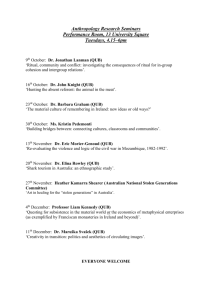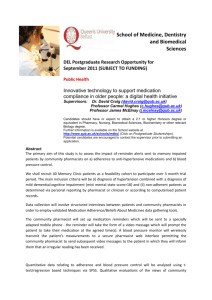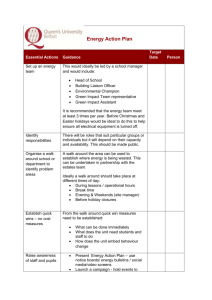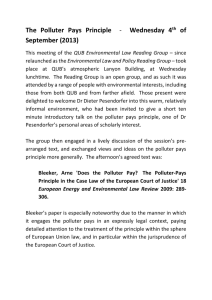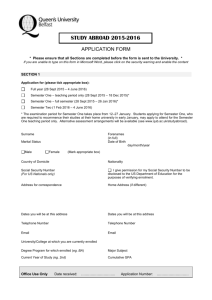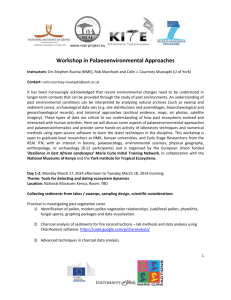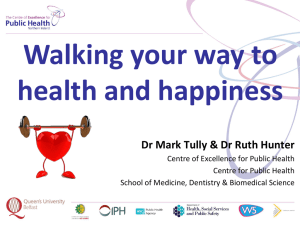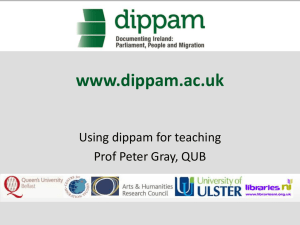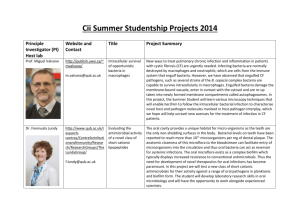Study Abroad Programme
advertisement
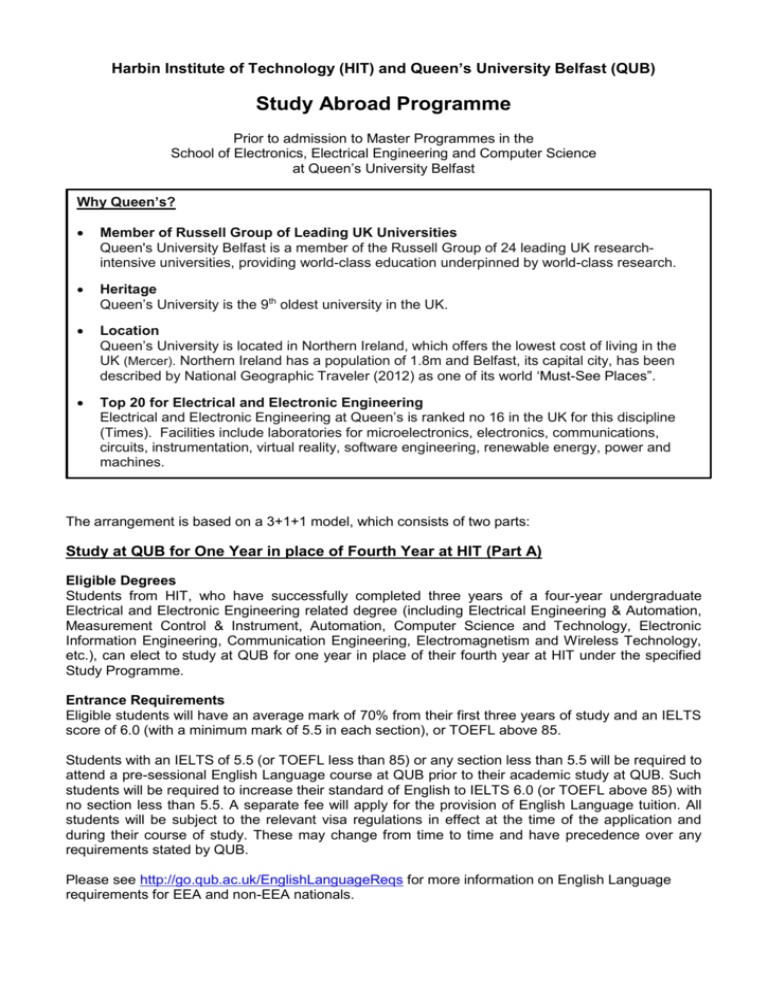
Harbin Institute of Technology (HIT) and Queen’s University Belfast (QUB) Study Abroad Programme Prior to admission to Master Programmes in the School of Electronics, Electrical Engineering and Computer Science at Queen’s University Belfast Why Queen’s? Member of Russell Group of Leading UK Universities Queen's University Belfast is a member of the Russell Group of 24 leading UK researchintensive universities, providing world-class education underpinned by world-class research. Heritage Queen’s University is the 9th oldest university in the UK. Location Queen’s University is located in Northern Ireland, which offers the lowest cost of living in the UK (Mercer). Northern Ireland has a population of 1.8m and Belfast, its capital city, has been described by National Geographic Traveler (2012) as one of its world ‘Must-See Places”. Top 20 for Electrical and Electronic Engineering Electrical and Electronic Engineering at Queen’s is ranked no 16 in the UK for this discipline (Times). Facilities include laboratories for microelectronics, electronics, communications, circuits, instrumentation, virtual reality, software engineering, renewable energy, power and machines. The arrangement is based on a 3+1+1 model, which consists of two parts: Study at QUB for One Year in place of Fourth Year at HIT (Part A) Eligible Degrees Students from HIT, who have successfully completed three years of a four-year undergraduate Electrical and Electronic Engineering related degree (including Electrical Engineering & Automation, Measurement Control & Instrument, Automation, Computer Science and Technology, Electronic Information Engineering, Communication Engineering, Electromagnetism and Wireless Technology, etc.), can elect to study at QUB for one year in place of their fourth year at HIT under the specified Study Programme. Entrance Requirements Eligible students will have an average mark of 70% from their first three years of study and an IELTS score of 6.0 (with a minimum mark of 5.5 in each section), or TOEFL above 85. Students with an IELTS of 5.5 (or TOEFL less than 85) or any section less than 5.5 will be required to attend a pre-sessional English Language course at QUB prior to their academic study at QUB. Such students will be required to increase their standard of English to IELTS 6.0 (or TOEFL above 85) with no section less than 5.5. A separate fee will apply for the provision of English Language tuition. All students will be subject to the relevant visa regulations in effect at the time of the application and during their course of study. These may change from time to time and have precedence over any requirements stated by QUB. Please see http://go.qub.ac.uk/EnglishLanguageReqs for more information on English Language requirements for EEA and non-EEA nationals. Module Choices at QUB On coming to the University, students will undertake six modules at Level 3 or 4 from the existing Electrical and Electronic Engineering suite of programmes, subject to timetabling and advice from the Advisor of Studies. QUB will report the marks obtained on the six modules to HIT, which will be used to determine the award of a degree from HIT. Progression to MSc Degree Programme at QUB (Part B) Students who gain 70% in their degree from HIT and who achieve an average of 60% or more in their 5 best modules at QUB will be eligible for entry to appropriate MSc degree programmes within the School. A list of eligible MSc programmes will be provided to HIT annually. The MSc degree will be awarded by QUB. Currently the following MSc Degree Programmes are offered: MSc Advanced Wireless Communications MSc Electronics MSc Telecommunications MSc Cyber Security (subject to approval) MSc SmartGrids (subject to approval) Fees Students studying on the programme shall pay the standard international fee for undergraduate programmes at QUB (£14,750 in 2013-14), which will be reviewed annually in line with other QUB fees. A scholarship of £2,200 (to be offset against fees) will available to the students. The fee for the MSc course will be the standard international fee for postgraduate taught programmes at QUB (£14,750 in 2013-14), which will be reviewed annually in line with other QUB fees. How to Apply Applicants are required to complete a Study Abroad Application Form, which is available on the Queen’s University website – www.qub.ac.uk/studyabroad The normal closing dates for return of completed application forms are 31 May for students wishing to attend in Semester 1 or the full academic year (commencing in the September), and 31 October for admission in Semester 2 (commencing in the February). Late applications may be considered. You must also submit an official transcript of courses taken and grades obtained at your home institution and an academic reference. These may be returned with the application form, or can be sent under separate cover. If English is not your first language, you must also enclose with the application documentation to prove proficiency in English (for example, transcripts of examinations taken to date). The application form should be completed electronically (as a signature is required on the final page, please scan this page), and email the full application form to: Exchange and Study Abroad team, Queen's University Belfast, Email: studyabroad@qub.ac.uk For further information contact: Harbin Institute of Technology: 李传江 控制科学与工程系副主任 Email: lichuan@hit.edu.cn Tel: +86 (0)451-86402726 Queen’s University Belfast: Advisor of International Students Dr Huiyu (Joe) Zhou Email: H.Zhou@ecit.qub.ac.uk Tel: +44 (0) 28 9097 4875/1753 School of Electronics, Electrical Engineering and Computer Science Queen’s University Belfast www.qub.ac.uk/eeecs, Email: eeecs@qub.ac.uk, Tel. +44 (0)28 9097 4669
